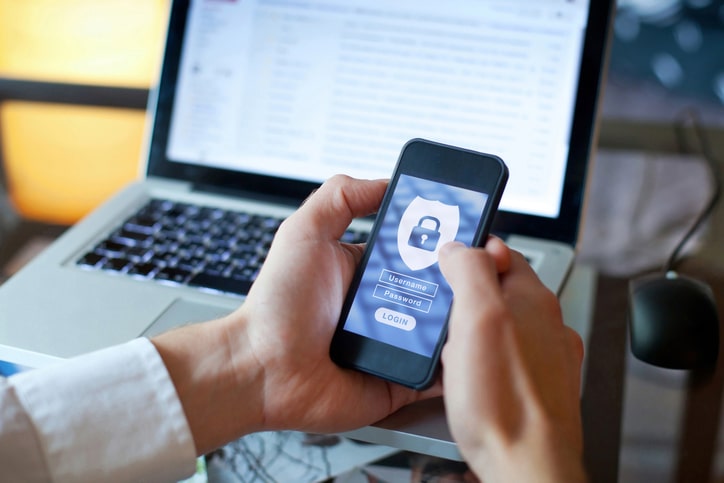Keeping Your Mobile Devices on the Go Secure
We take our mobile devices everywhere we go and use them to carry out many activities. Our mobile devices today carry sensitive data – both personal and office related. This has made them a hackers’ favorite target. Do you know the risks that come with portable gadgets? Discover how you can safeguard your mobile devices from these threats.
Organizations are using mobile devices to enable employees to work from anywhere and at any time. Your employees can work from anywhere convenient for them, increasing their productivity.
Increased use of mobile devices poses some threats to your network. Organizations need to adapt their cybersecurity to account for mobile device security risks. Understanding these threats can help you take steps to deal with them.
A breach via an employee’s mobile device connected to your network can affect your system. For example, if any employee falls victim to a phishing scam, the malware can spread to your network.
How can you secure mobile devices connected to your network?
Clients always ask Network Security Associates how they can secure their mobile devices on the go. Network Security Associates provides professional IT services. This article will help you discover mobile device risks and how you can protect your mobile devices.

What Is Mobile Device Security?
Mobile device security refers to the steps taken to secure sensitive data on portable gadgets. It also includes the measures you take to prevent unauthorized users from using portable devices to access your network.
Mobile device security covers gadgets that your employees can use to access your network. These appliances can include laptops, smartphones, wearables, tablets, and other mobile devices.
CTOs and CIOs focus on securing mobile devices from threats, such as phishing scams, malicious mobile apps, spyware, data leakage, and unsecured Wi-Fi networks. They also have to consider the risk of employees losing their gadgets, and an unauthorized user using them to gain access to the company’s network.
Mobile Device Security Threats
The typical mobile device security threats include:
- Malicious Apps: these applications resemble useful programs, but their developers use them to collect your data. For example, an employee can download an app that lets them scan documents. The app can require unnecessary permissions, such as requests to access messages. Attackers may use the information they get from texts to infiltrate your network.
- Malware and Viruses: many people think phones are not susceptible to malware and viruses. This belief is not true as your device can get infected with viruses. For example, you may download an infected attachment or app. People are often not keen to examine downloads. A single employee whose appliance gets compromised can be a path for cybercriminals to access your network.
- Smishing: This threat resembles a phishing scam, but its mode of delivery is a text. Cybercriminals send a message pretending to be a reliable authority asking the employee to undertake a specific action. For example, they can pretend to be your bank, notifying you that someone has compromised your account. They can ask the recipient to download an attachment, and delays can lead to severe consequences. An unsuspecting employee downloads the infected attachment, infecting your network with malware.
- Network Spoofing: cybercriminals can spoof a network that your employees use. For example, the attackers can create an unsecured Wi-Fi that resembles airport Wi-Fi. They can make minor alterations to the Wi-Fi name that an unsuspecting employee cannot spot. The attackers can see what users of the network are doing and use the information they get for their scams.
- Unpatched Vulnerabilities: attackers can exploit unpatched vulnerabilities to infiltrate your network. For example, you may not update your programs. Updates for software and apps have enhanced security, as developers use them to close loopholes they have noticed. If an employee uses the outdated app on their mobile device with access to your network, cybercriminals may use the gadget as a path to your system.
Mobile Device Security Tips
How can you protect mobile devices with access to your network? These tips will help reduce vulnerabilities that attackers can exploit.
- Avoid Public WiFi: You should encourage users that access your network with mobile devices to avoid using public Wi-Fi. They should use your secured office Wi-Fi when they are in the office and a secure one when they are working from remote locations. You may encourage them to use defense tools, such as Virtual Private Network (VPN), to have an encrypted connection.
- Do Not Trust Public USB Charging Stations: One might use free charging stations because of their convenience. For example, you may charge your phone with them before your flight. Be careful as you use these posts. Cybercriminals infect some of them with malware and can collect your data when you plug your device. Purchase a battery-powered mobile charger for circumstances when you cannot use regular outlets to charge your device.
- Download Your Materials Before Leaving the Office: You may need to use files on your system while on the road. Download them using your home or office connection. This preparation prevents the need to download documents using compromised networks while traveling. Take precautions if you forget some files, and you have to download the documents using public connections.
- Train Your Employees to Be Vigilant: As cybersecurity protocols seal system vulnerabilities that cybercriminals can use, attackers are focusing on employees. They are using social engineering to take advantage of unsuspecting employees. Training workers can help them identify and avoid scams. For example, educating them on how smishing campaigns occur enables them to detect messages from scammers. The employees can report attempts to breach your network for additional security measures.
- Use Strong Passwords and Biometrics: Strong passwords and biometric security, such as fingerprint authenticators, guarantee only allowed users can access your network. Most unauthorized people will struggle to access the device if you lose it. Avoid saving passwords on your browser, as a cybercriminal can use this feature to get your login credentials. Memorize them or write them where you are sure nobody can access them.
- Install an Antivirus Program: These applications can help you detect malicious files and apps. Some antivirus apps provide additional capabilities that can secure your device. For example, some programs can erase your data when you lose your device, while others can help you identify and block unknown callers or messages that pose a threat. You may also use the software to clear your browsing history and cookies. Attackers can access your cookies and use their information to access your network.
- Update Your Software: Updates by app developers seal vulnerabilities that cybercriminals can exploit. Install these modern versions of apps to ensure your security measures are up-to-date. Companies that develop mobile programs, such as Apple iOS and Google Android, roll out frequent updates. Keep up with them to patch vulnerabilities they have identified.
- Establish and Share Mobile Device Security Processes and Policies: Develop mobile device rules and communicate them to your staff. The rules can include specific devices, allowed OS levels, what employees might access using portable appliances, and password regulations.
- Use a Cloud Access Security Blocker: A CASB (Cloud Access Security Blocker) sits between cloud users and cloud service providers to implement compliance, security, and governance policies for cloud technologies. It can help you extend your office cybersecurity to the cloud.
Network Security Associates (NSA) provides IT services, data protection, and compliance solutions. We provide reliable, customized IT support that helps our clients achieve their objectives.
NSA can help you protect mobile devices that access your network. Our experts will assess mobile security, identify vulnerabilities, and develop protocols to secure your mobile devices.
Are You Ready to Secure Your Mobile Devices?
Contact us today and let us help you secure your mobile devices from mobile security threats.

